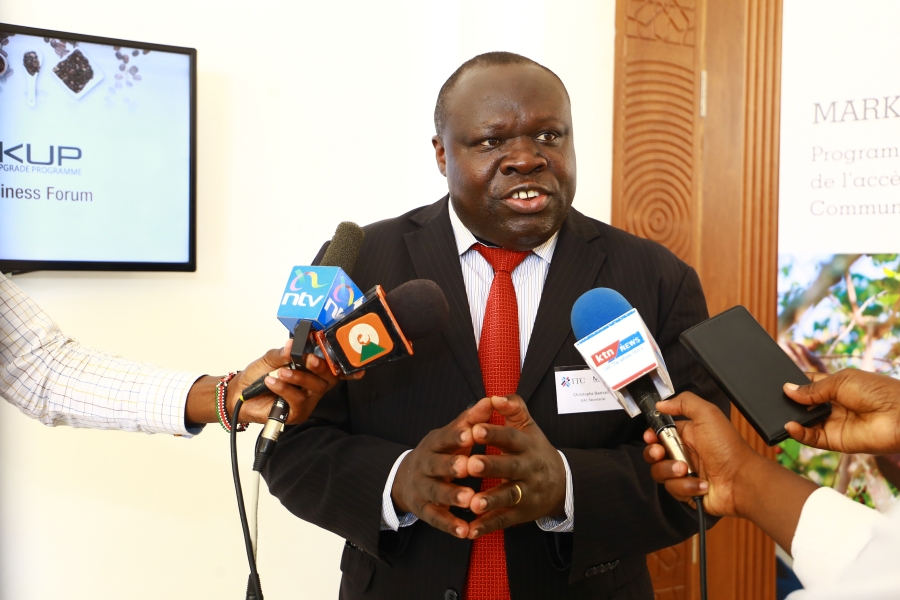
EAC Coffee Business Forum kicks-off in Mombasa
…. as EAC provides strategic opportunities for marketing more coffee
East African Community Headquarters, Arusha, Tanzania, 12th February, 2020: The East African Community Coffee Business Forum kicked off in Mombasa, Kenya with high level speakers from public and private sector exchanging and seeking to learn from each other as well as find new markets and seal international sales opportunities.
The forum organised by EAC jointly with the African Fine Coffee Conference and Exhibition and financed by the European Union through the MARKUP Programme will feature a week of interactive discussions, workshops and networking events.
Speaking at the official opening ceremony, the EAC Deputy Secretary General in charge of the Productive and Social Sectors, Hon. Christophe Bazivamo, said coffee was an important and strategic crop for the EAC region, adding that the composition of EAC trade continues to be dominated by agricultural commodities, including coffee.
Hon. Bazivamo told the participants that EAC produces both Arabica and Robusta coffee but unfortunately its combined coffee exports of green coffee beans by volume to the world market are less than 10% despite the growing global potential for coffee.
Hon. Bazivamo informed the stakeholders that world coffee consumption has been on an upward trend for the last 10 years and is projected to continue rising, noting that the onus was the EAC to come up with new strategies for production and marketing of more coffee.
The Deputy Secretary General assured the participants at the forum that coffee growing remains a priority for the EAC region as clearly outlined in the regional economic bloc’s policies including the EAC Agriculture and Food Strategy, EAC Industrialization Policy and Strategy as well as EAC Development Strategies.
He underscored the importance of Coffee as global commodity, and one in which EAC countries could and should be extremely competitive.
On his part, the European Union (EU) Head of Delegation to Tanzania and the EAC, Ambassador Manfredo Fanti, said the EAC Coffee Business Forum was a good example of what EU was willing to do with Africa to support local and regional export competitiveness in order to increase market opportunities for African companies in Europe and in other parts of the World.
The EU envoy observed that coffee was one of the major cash crops in the EAC, constituting a significant share of total export value in each EAC country. The sector was also important in creating substantial employment and income generation opportunities for the farmers.
Amb. Fanti challenged the participants at the forum to use the five-day workshop to discuss ways of eliminating various forms of trade barriers among coffee trading countries, and catalyse additional public-private collaboration in order to mobilise investments and enhance the role of coffee in the regional economy.
The Executive Director of the International Trade Centre (ITC), Ms Dorothy Tembo, on her part, underscored the importance of bringing together public and private stakeholders to discuss ways of boosting trade and investment opportunities for coffee exporters as an occasion to identify the opportunities and challenges facing the EAC region.
She informed the participants that the solutions emerging from the deliberations of the forum will benefit not only the EAC but other parts of the African continent experiencing similar challenges include trade barriers, access to finance, standards and market access.
The key themes being addressed include: the removal of coffee trade barriers with a spotlight on the World Trade Organization; Trade Facilitation Agreements; innovative mechanisms to facilitate access to credit, buyer and investor priorities globally as well as how regional growers and traders can capitalize on new opportunities around the world.
Notes to Editors
The Market Access Upgrade Programme (MARKUP)-https://www.eacmarkup.org/ - is an initiative of the EAC Secretariat, funded by the EU and Germany Federal Government (BMZ).
It is implemented by various agencies, including the International Trade Centre (ITC) and Deutsche Gesellschaft für Internationale Zusammenarbeit (GIZ), UNIDO, Uganda Coffee Development Authority (UCDA) and other partners. MARKUP aims to increase exports of selected value chains, promote regional integration and access to the European market by addressing specific challenges that SMEs, Trade and Investment Support Institutions (TISIs) and policy-makers face.
This will allow EAC agribusinesses to benefit from greater business opportunities in both East African and European markets and to meet the growing demand for EAC exports. In this way, MARKUP will help create sustainable market linkages between Europe and the EAC, and contribute to job creation and inclusive development in the region.
MARKUP targets coffee in all five beneficiary countries- Burundi, Kenya, Rwanda, Tanzania and Uganda. Other priority sectors are spices, avocadoes and other horticultural products and tea. The areas of focus include:
- The identification and elimination of barriers to trade;
- Improving competitiveness;
- Strengthening of value addition;
- Ensuring compliance with international standards;
- Supporting access to finance, and;
- Market exposure for SMEs
- ENDS -
For more information, please contact:
Simon Peter Owaka
Senior Public Relations Officer
Corporate Communications and Public Affairs Department
EAC Secretariat
Arusha, Tanzania
Tel: +255 768 552087
Email: sowaka [at] eachq.org
About the East African Community Secretariat:
The East African Community (EAC) is a regional intergovernmental organisation of six Partner States, comprising Burundi, Kenya, Rwanda, South Sudan, Tanzania and Uganda, with its headquarters in Arusha, Tanzania.
The EAC Secretariat is ISO 9001: 2015 Certified
